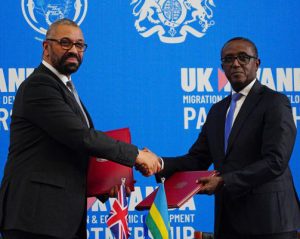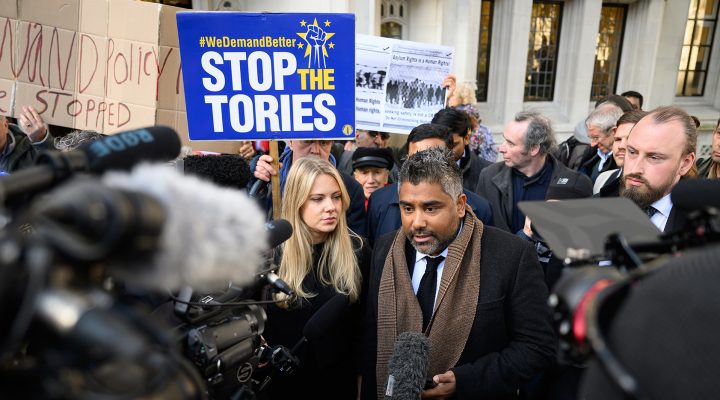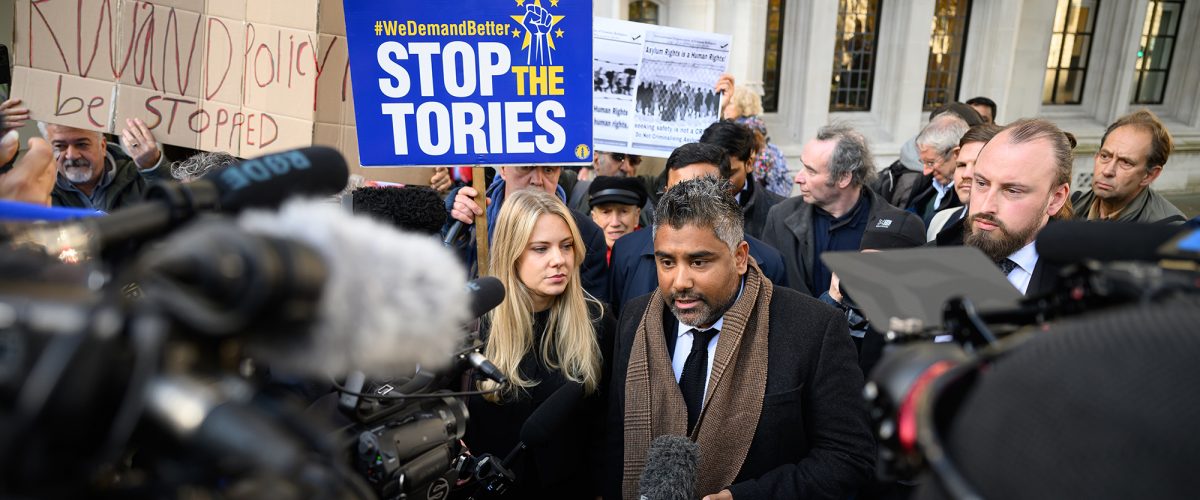In the last couple of weeks, three issues have dominated debate in Britain: the Israeli/Hamas war in Gaza, the COVID-19 inquiry and Rishi Sunak’s migration deal with the Rwandan government.
Of the three, the British and Rwandan government’s plan designed to allow the British government to send refugees or asylum seekers to the East African country has been the most controversial.
By the middle of last month, the UK Supreme Court ruled Rwanda is not a safe country to send refugees or asylum-seekers fleeing danger or hardship, but Sunak feels otherwise and insists on continuing with the deal, which began negotiating with Rwanda in April 2022.

James Cleverly, British home secretary, and Vincent Biruta, Rwandan foreign minister, at the signing of the migration deal in Rwanda.
Last week, Sunak dispatched James Cleverly, British home secretary, to Rwanda to sign a migration treaty with the Paul Kagame administration. There, Cleverly and Vincent Biruta, Rwandan foreign minister, put pen to paper to that effect.
According to media reports, Rwanda already has benefited 240 million pounds ($300 million) from the deal, with monies to cover logistics and infrastructure for the plan, even with asylum seekers yet to be transferred.
“We feel very strongly that this treaty addresses all of the issues raised by their lordships in the Supreme Court and we have worked very closely with our Rwandan partners to ensure that it does so,” Cleverly said of the agreement.
For his part, Sunak described the deal and the “Safety of Rwanda” bill initiated in that regard as the toughest immigration bill ever. The bill, he said, “blocks every single reason that has ever been used to prevent flights to Rwanda from taking off.” He added: “The only extremely narrow exception will be if you can prove with credible and compelling evidence that you specifically have a real and imminent risk of serious and irreversible harm.”
Sunak’s views were conveyed at a news conference a day after Robert Jenrick, his immigration minister, resigned over disagreements with the government’s plan.
In giving reason for his resignation, Jenrick said the Sunak administration’s emergency Rwanda legislation “does not go far enough” and that “stronger protections” are needed to end “the merry-go-round of legal challenges which risk paralyzing the scheme.”
He added: “I am unable to take the currently proposed legislation through the Commons as I do not believe it provides us with the best possible chance of success.” As far as he’s concerned, the bill is “a triumph of hope over experience.”

Suella Braverman delivers a speech on the third day of the Conservative Party Conference on October 3, 2023, in Manchester, England. (Photo by Carl Court/Getty Images)
Reacting to Jenrick’s resignation, Sunak said it was disappointing but “based on a fundamental misunderstanding of the situation.”
The Safety of Rwanda Bill aims to maneuver specific aspects of the Human Rights Act and gives the impression the Sunak administration is now resolved to heed the advice of Suella Braverman, Cleverly’s predecessor, who recently was sacked as home secretary by Sunak after she spoke out accusing British law enforcement officials of bias in regard to antisemitic marches held in Britain over the war in Gaza.
Braverman had accused Sunak, in a letter she wrote after she was sacked, of weakness or inaction regarding certain agreements they had.
“As you know, I accepted your offer to serve as home secretary in October 2022 on certain conditions. … I agreed to support you because of the firm assurances you gave me on key policy priorities,” Braverman wrote. “These were, among other things: reduce overall legal migration as set out in the 2019 manifesto through, inter alia, reforming the international students route and increasing salary thresholds on work visas” and “include specific ‘notwithstanding clauses’ into new legislation to stop the boats, i.e. exclude the operation of the European Convention on Human Rights, Human Rights Act and other international law that had thus far obstructed progress on this issue.”
To have any hope of succeeding, the Safety of Rwanda Bill must be approved by Parliament. Debate will begin this week.
There are concerns within the ruling Conservative Party that should the bill denounced by many human rights activists and religious leaders fail to gain the approval of the two houses of Parliament, it could create a crisis that may cost the Tory party its leadership, as general elections are just a year away.

Lewis Mudge
Lewis Mudge, Central Africa director at Human Rights Watch, reacted to the Safety of Rwanda Bill in an article titled “The UK Can’t Legislate Away Rwanda Rights Record.” He said: “The United Kingdom government’s fixation with expelling asylum seekers to Rwanda went from absurd to grotesque,” and “Having undermined evidence, ignored human rights organizations’ reports, ignored its own recent assessments, and lost its case in court, the UK government is now desperately trying to circumvent the Supreme Court’s judgment.”
Mudge pointed out: “The UK can’t legislate its way around the fact that Rwanda counters criticism with violence and abuse, including against refugees. The UK is at a dangerous crossroads, with the home secretary acknowledging the bill is not in compliance with the UK’s Human Rights Act.”
The Rwandan government, however, has rejected such unflattering viewpoints about its human rights record. And in April last year, Kagame was quoted by news24 as saying of the UK-Rwanda deal: “We are not trading human beings, please. This is not the case. We are actually helping.”
BNG reached out to the United Nations refugee agency, UNHCR, for comment on the UK-Rwanda deal.
Louise Donovan, senior communications officer in the UNHCR regional bureau for Europe, responded: “Regarding the latest developments and the new treaty between the UK and Rwanda …, UNHCR has not been involved in negotiations between the authorities of the UK and Rwanda on the scheme. We are analyzing the treaty and the content of the ‘bill.’”

Louise Donovan
She added: “UNHCR has consistently conveyed our longstanding and deep concern about the ‘externalization’ of asylum obligations. Under international refugee law, the primary responsibility for assessing asylum claims and affording international protection rests with the state in which an asylum-seeker is, whether at land borders or at sea, and seeks that protection.”
She continued: “This obligation remains unaltered by the transfer of asylum-seekers or extraterritorial processing. While legal transfer arrangements on asylum cooperation may be made between states, such measures must ensure refugee protection and help share the responsibility for refugees equitably among nations, rather than shifting it.”
After the UK Supreme Court ruling, UNHCR, said in a statement it welcomed the decision and went further to advise on the way forward: “UNHCR recognizes the challenges presented by irregular arrivals across the Channel and calls for practical, workable alternatives to the MEDP arrangement, including through cooperation with European neighbors in the spirit of responsibility-sharing which lies at the core of the Refugee Convention.”
The agency further called for “fair and fast asylum procedures that respect international standards” and cooperation “with international partners to secure the safe and dignified return of those found not to be in need of protection.”
Anthony Akaeze is a Nigerian-born freelance journalist who lives in Houston. He covers Africa for BNG
Related articles:
Rwanda: 29 years after the genocide, there are still lessons to learn
‘Stop the Boats’ bill passes UK Parliament but plan to ship migrants to Rwanda ruled illegal
On migrant crisis, the U.S. and UK governments share a controversial tactic in common


